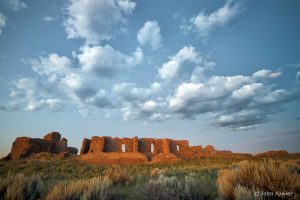
FOR IMMEDIATE RELEASE
December 14, 2023
Contacts:
Mark Allison, New Mexico Wild, (505) 239-0906, mark@nmwild.org
Ellen Montgomery, Environment New Mexico, (720) 583-4024, lmontgomery@environmentnewmexico.org
Paul F. Reed, Archaeology Southwest, (505) 486-4107, preed@archaeologysouthwest.org
Ernie Atencio, National Parks Conservation Association, (505) 444-0032, eatencio@npca.org
New Mexico Conservation Groups Praise State’s Decision to Extend Moratorium on Oil and Gas Leasing around Chaco Canyon
State Land Office’s Action Will Help Protect Chaco from Encroaching Oil and Gas Leasing for Another 20 Years
(Santa Fe, NM) – New Mexican conservation groups are applauding State Land Commissioner Stephanie Garcia Richard’s action to extend a moratorium on oil and gas leasing on nearly 70,000 acres of state land surrounding Chaco Canyon for the next 20 years.
With this action, Commissioner Garcia Richard has listened to longstanding calls from Pueblos and other Tribes, along with other community members in New Mexico, to limit further development in this fragile region and has remained steadfast in her efforts to reduce the threat that leasing and drilling pose to this sacred landscape.
This action is consistent with the Department of the Interior (DOI)’s June 2023 administrative withdrawal of federal lands within the same area from future oil and gas leasing, along with legislation re-introduced by the entire New Mexico Congressional delegation. It exemplifies the partnership between state and federal governments to provide the strongest possible protections for the Greater Chaco Landscape and its irreplaceable cultural heritage.
Like DOI’s withdrawal, the state leasing moratorium will not affect Tribal, allottee-owned, or other private lands, and acknowledges that permits and rights-of-way could still be provided to facilitate development activities, including on Navajo allottee lands. Under the actions taken by the New Mexico Land Office and DOI, only federal public lands and state trust lands will be withdrawn from future leasing.
Below are several statements detailing what this broad support for increased protections means for Greater Chaco.
“Many Chacoan sites exist outside the Park’s official boundaries, so oil and gas development on nearby state trust lands almost always means the loss of artifacts, history, and sacred sites as well as wildlands, habitat, and dark skies,” said Mark Allison, Executive Director of New Mexico Wild. “Commissioner Garcia Richard’s actions are exactly the kind of common sense, balanced, and forward-thinking leadership this sensitive area needs.”
“The Greater Chaco Region is so immensely important for Puebloan and Diné peoples – culturally, historically, and spiritually. That’s why Commissioner Stephanie Garcia Richard’s decision to extend the moratorium on oil and gas leasing within 12 miles of the park’s boundaries is such a critical step in protecting this area for the next generation. This 20 year extension signals the continued alignment between state and federal priorities,” said Adrian Angulo Montaño, Policy and Program Director for Nuestra Tierra Conservation Project. “We are grateful for the state’s action, as well as the Department of the Interior’s administrative withdrawal. We look forward to working with our leaders in Congress to secure permanent protection for this sacred landscape and future generations.”
“We are thrilled that the New Mexico State Land Commissioner has extended the oil-gas moratorium for 20 years, for more than 70,000 acres of State Trust lands in the 10-mile protection zone around Chaco Canyon. Thank you, Stephanie Garcia Richard,” said Paul F. Reed, New Mexico State Director, Archaeology Southwest.
“National Parks Conservation Association is grateful for Commissioner Garcia Richard’s commitment to supporting Pueblos, local Tribal communities and the public in protecting this unique, world-class cultural landscape that is sacred to so many,” said Ernie Atencio, NPCA’s Southwest Regional Director. “As a matter of Tribal sovereignty and economic opportunities, we support the exemption for Tribal and Navajo allottee lands, and we look forward to working with the Department of Interior and Congress to protect more of the public lands surrounding Chaco Culture National Historical Park.”
“This is great news to follow DOI’s 20-year public lands withdrawal around Chaco Canyon. Oil and gas pollution doesn’t care if development is happening on federal or state land, and neither do the benefits we all get from protecting these lands,” said Michael Casaus, New Mexico State Director of The Wilderness Society. “The leadership by State Land Commissioner Garcia Richard to protect this landscape continues to be a model for managing this region for its critical cultural, historical and ecological values.”
“Chaco Canyon is a special place for many New Mexicans so it’s appropriate that the state would extend protections for the Greater Chaco Landscape. Thanks to Commissioner Stephanie Garcia Richard for taking this important action and complementing the actions taken by Secretary Halaand and the Biden administration earlier this year. Now even more of this precious area is safe from destruction,” said Ellen Montgomery, Environment New Mexico Public Lands Campaign Director.
Additional Background:
The Greater Chaco Landscape is sacred to New Mexico and Tribal communities that have lived in the region since time immemorial. The land is an ancestral homeland that holds spiritual and cultural significance for these communities. Pueblos and other southwestern Tribes have been calling on the state to limit further oil and gas development in this sensitive area, and this moratorium extension shows that the state is listening.
After decades of oil and gas development in the region, which has destroyed significant cultural sites and transformed others into industrial parks, this action not only protects the physical landscape but also the health and air quality of the tribal communities that call Chaco home.
###

